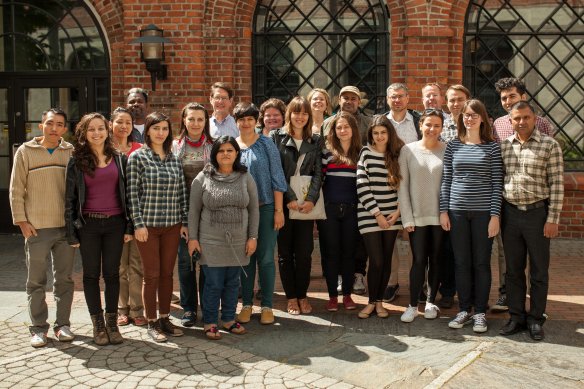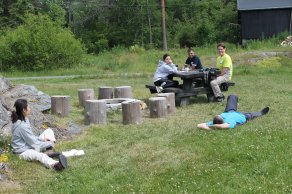Since 1969, PRIO has organized and taught a graduate-level course on peace research for the University of Oslo International Summer School. For six weeks, students from around the world learn about the most current topics in peace research, including why conflicts start, why and how conflicts endure, how peace can be built in the aftermath of conflict, and the ethics of warfare. Approximately 15 lectures are given during the course, many of them by PRIO researchers, providing a fantastic opportunity to showcase PRIO’s research to new and upcoming peace scholars and practitioners.

Summer School students 2014 with the PRIO coordinators.
Photo: Julie Lunde Lillesæter, PRIO
There is an Art to Teaching Peace Research
As the coordinators of this course for several years now, we know that organizing and teaching a course in the field of peace and conflict studies requires, first of all, inquiring minds. Our students – on average 25 a year – come from countries all around the world, many of which have experienced various types of conflict. The students have come from countries such as Nepal, Afghanistan, Sudan, Ukraine, Russia, Chechnya, Nigeria, Kenya, Ethiopia, Myanmar, Palestine, India, Sri Lanka, Pakistan, Uganda, Senegal, Thailand, Brazil, Nicaragua, Azerbaijan, Armenia, Serbia, Georgia, and many others; students have also come from Western European countries and North America. The students have relevant social science educational backgrounds (students must have a bachelors degree to be admitted to the course), and many students have additionally worked in governments, non-governmental organizations, inter-governmental organizational like the United Nations, and other groups. Some are PhD students, and even professors. They are highly motivated to learn more about the academic study of peace and conflict in order to understand why conflicts break out and how peace can be built.
The Students
The peace research students also bring a wealth of experience to the classroom, and each year we realize that we as coordinators learn just as much from the students as the students learn during the course. Understanding the experiences and perspectives of individuals who have lived through conflict not only gives us a chance to interface with and challenge our academic theories about peace and conflict, but such an opportunity also reminds us how important the study of peace research is to millions of people around the world. The question of why conflicts start and how they can be resolved is not merely an academic matter – it has real-world relevance and resonance. Peace and conflict have real and serious consequences.
Workshops & Practical Training
The second dimension of the art of teaching peace research is providing opportunities to the students for more practical, hands-on

Break during summer school workshop in the Oslo woods
learning that requires them to work interactively with their fellow students. In addition to the lectures, the students go through a two-day workshop on conflict resolution and a peace negotiation role play. The workshop occurs at a cabin in the forest surrounding Oslo, and is led by an experienced facilitator from the Nansen Center for Peace and Dialogue. In the peace negotiation role play, students work in teams to play key roles, such as rebel groups and governments, in an effort to try to hammer out a peace agreement for a real-world conflict. In past years, students have attempted to resolve the conflicts in Western Sahara and in the eastern Democratic Republic of the Congo, with varying degrees of success. Lastly, the students are also responsible for writing a 15 page research paper in groups – an exercise in individual-level conflict resolution. These practical exercises pull students out of the traditional, individualistic learning format of the college classroom and push them to learn and practice new skills in conflict resolution and peace building, which helps the students to understand why resolving conflicts can be so incredibly difficult.
The Teachers
The third dimension of the art of teaching peace research revolves around inquiring minds again – but this time, these are the minds of the individuals who give many of the course’s lectures and who are the academic backbone of the course. The course lecturers include researchers from PRIO, researchers other research institutions in Oslo, and individuals from peace research-related organizations such as the Norwegian Refugee Council, NATO, and the Norwegian government. Teaching brings the opportunity to explain one’s research and research interests, as well as the importance of various topics in peace research. It gives practitioners the opportunity to connect their work with the academic world (and vice versa), and to impart valuable real-world lessons and experiences to the students. Teaching sparks students’ interest in the study of peace and conflict, allows instructors to learn from students’ knowledge and experiences, and helps to keep the field of peace research fresh, alive, exciting, relevant, and at the forefront of current events. The researchers who have lectured for this course over the years have served as an inspiration to our students, and to us. Many students from previous years have told us that the peace research course – and specifically, what students learned – motivated them to start masters and PhD work in the field of peace and conflict studies, and/or to start new careers in peace-related fields, such as diplomacy, humanitarian work, and education.
The Networks
By the end of the course, our students leave Oslo with a group of new friends and colleagues, with new perspectives and fresh insights, and with new hopes for the future. Some of our students have married each other, while others have stayed in touch over the years, shared their work, and supported each other through happy events as well as more difficult ones. Our favorite words to hear at the end of the course are how much the students wish that the course could continue on for just a few more weeks – and couldn’t we go on a second cabin trip at the end of the course?!?
We also leave the course each year with new friends and new perspectives, with ideas for future research and with thoughts for how to improve our own teaching. Though this year’s course has occurred during several major ongoing conflicts, including Syria, Iraq, Israel, and Ukraine, we leave the course this year with a very positive feeling, knowing that we have helped to introduce 20 new individuals to the dynamic field of peace research. We are also departing the course this year for the last time, as we move on to a new phase in our lives, but we do so with a deep feeling of gratitude to all the students, lecturers, and people behind the scenes that we have worked with since 2007 to make this course so successful.
I was one of those students who attended Peace Research course this year. With lectures, cabin trip, role play negotiations the course opened new perspectives for me. It was very interesting. Thanks to our course leaders- Stephan and Kendra, all lecturers and also to students.
I m Sathees from Sri Lanka. I m one of the luckiest students who attended for this outstanding course from last year (2013). Peace Research inspired me a lot and connected with awesome peace loving friends from all over the globe. I m highly appreciated the course and the outstanding job from great personalities Stephan and Kendra and moral attachments from PRIO!!!
it was a great experience with Kendra and Stephan…..both were very cooperative and nice towards all the students. exposure to different streams like law, IR, philosophy,etc….enriched our knowledge. Lecture from the general from UN was simply wow!….I am very grateful to my course leaders and the expert who came to give their deliberations…..thank you so much….
This article captures the essence of what made this year’s course a huge success. I was stimulated and challenged by every aspect described here. Stephan and Kendra did a fantastic job as the course leaders. The cabin trip enabled us to get to know one another at the start of the course. The lectures were superb, as were the readings. The practical exercises were a lot of fun and gave us an opportunity to put certain principles into action. And the relationships with the other students really moved me and gave me an appreciation for many different perspectives and experiences from around the world. The University of Oslo International Summer School will be have a hard time finding replacements for Stephan and Kendra, but they must do it. This course must continue!
I am Keshab Dahal from Nepal. Attending this peace research course in 2013 was a turning point of my academic life. A candidate like me from a least developing country Nepal experienced an unbelievable atmosphere learning together with the students from around the world, the class was so diverse that out of 27 students we were from 25 different nationalities which I had never expected.
I came with a view and went with a perspective, it was a fun learning with the prominent figures Stephan and Kendra whose academic qualities inspired me to come back to Norway to study further in peace studies. International summer school at University of Oslo was so crucial for me to have received the prestigious quota scholarship from Norwegian government for 2 years full time masters degree in peace and conflict transformation at University of Tromso. I can’t stay without thanking the course coordinators Stephan and Kendra and my 2013 peace research friends for the wonderful experience and the onward privilege !